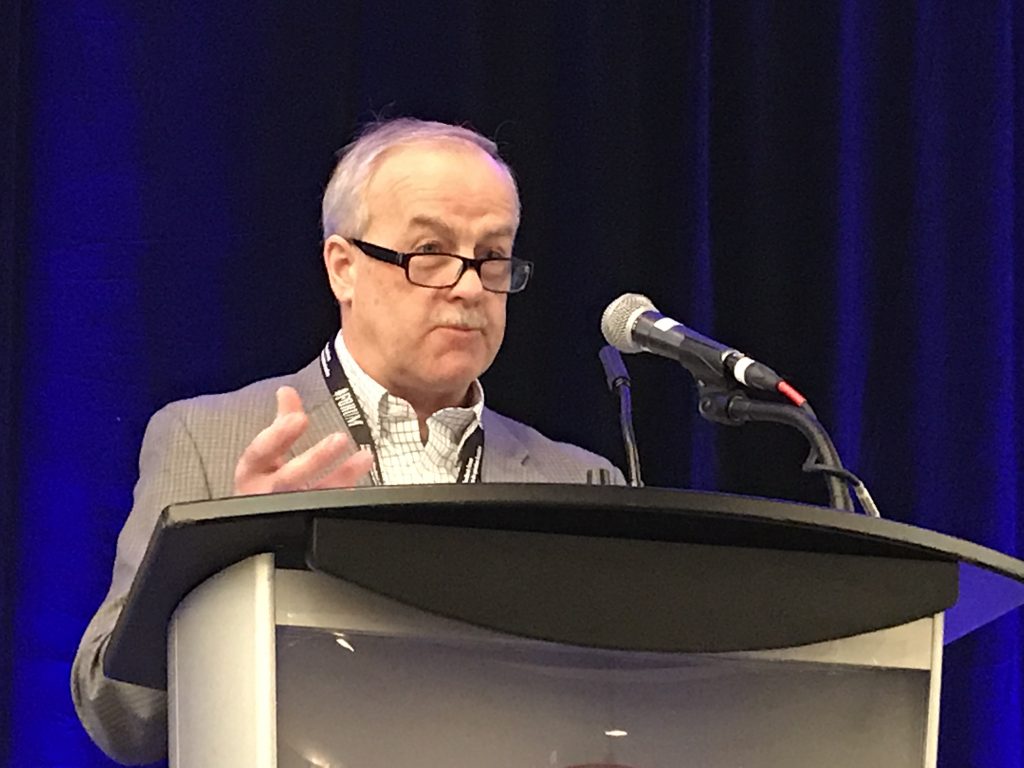
Industry News
News
Speakers focus on sustainable solutions in Moncton
April 4, 2018 - The Canadian Woodlands Forum’s 99th annual general meeting and 2018 spring meeting is taking place at the Crowne Plaza hotel in downtown Moncton, N.B. With more than 350 total registrants this year, attendees were tightly packed into the session rooms.
The morning’s sessions ranged from rebuilding public trust in forestry, to discussing best practices for safety and wellness in the forestry workplace from eating right to managing stress and potential cannabis legalization and opioid concerns.
“One thing that we spend a lot of time doing is to present issues and challenges that members of the whole supply chain face day-to-day,” Peter Robichaud, executive director of the CWF, told CFI. “We’re dealing with very hot topics in forest management, as well as looking at harvesting operations, and efficiency and productivity levels of our contractors that are doing the work, and then also focusing on taking the wood from outside and moving it in through the mill gates and looking at our trucking functions as key members of the supply chain collectively wanting to learn new improvements, best practices, and technologies that might be able to help them maintain a viable business.”
One other area of focus was the afternoon session on developing sustainable solutions in the face of climate change and in the interest of preserving forests and ecosystems for future generations.
Natural Resource Canada’s (NRCan) Vincent Roy discussed developing sustainable fibre solutions saying climate change in forests and the pressure on forests will increase, affecting the fibre supply and shrinking it.
Roy said the Canadian Wood Fibre Centre's (NRCan) Fibre Solutions Program is a three-part program to develop sustainable fibre solutions.
Maximizing genetic gain for plantations provides a better opportunity to control species composition and maximize the gains and desired traits like growth, resistance and wood quality, Roy said.
Rapid selection of conifers through the FastTRAC project uses genomic-assisted selection like DNA extraction to improve tree traits. Roy said the project hopes to develop seedlings that are resistant to spruce budworm in the near future.
Adam Dick from NRCan spoke about enhanced forest inventory in Atlantic Canada, while NRCan’s Jamie Farrell talked about species identification using LiDAR (light detection and ranging).
Nelson Thiffault from NRCan discussed challenges for vegetation management in an era of global change.
Thiffault said vegetation management is about reducing stress on trees by managing competition and allowing the desired species to get sufficient nutrients to help an ecosystem thrive. Too many trees on a site results in many smaller, weaker trees instead of a select few strong ones, he added.
"Forest vegetation management is a concept that has evolved over the decades," Thiffault said. It has shifted from a wood production definition to a sustainable forest management definition to an ecosystem-based management approach, he said. This means treatments used are maintaining ecosystem functions and resilience.
We don't have all the questions answered about vegetation management, Thiffault told the crowd. Vegetation management will play an integral role in preserving the world's forested areas with global changes like population numbers going up and reaching 10 billion people by 2080, Thiffault said adding that more people means more demand for wood products.
NRCan’s Chris Edge presented on the direct and indirect effects of a glyphosate-based herbicide in aquatic ecosystems.
"All of our actions have an effect on the system," Edge said. "We [he and his team] evaluate the risk of using a particular herbicide and we think about exposure and toxicity."
Approximately 40,000 ha are clearcut annually in New Brunswick, Edge said, which is 1.4 per cent of crown land.
The concern is on exposure to animals living in an aquatic ecosystem, Edge said before discussing some of the trials he and his team performed on ecosystems to understand the effects on organisms, like frogs, living within.
J.D. Irving’s Greg Adams discussed proactive approaches forest managers can use to improve resilience in a changing climate.
Adams said anticipating impact at a particular forest level is difficult when considering temperature changes and extremes, precipitation, insect and disease dynamics, CO2 levels and forest fires.
There are four specific areas Adams said are important to promote a healthy forest and forest industry. The first is ensuring biologically and economically sound decisions are made in the present day.
Adams said this first point really just means doing the right things in the right places.
The next approach is maintaining vigorous growth through stand tending. "This reduces the exposure time to risk and increases management options to respond to change," Adams said.
The third method is understanding genetic adaptive variation patterns for important species and conducting tree improvement across the region. "I would argue, one of the most proactive things you can do to improve resilience," Adams said.
The fourth approach is being aware of the most up-to-date research and being prepared to blend new strategies and technology rapidly in response to change as it progresses.
"Some of the species that are predicted to decline over the next 10 years, it's not because they're maladapted, it's because they're outcompeted," Adams said adding that the role of silviculture to influence that outcome should not be underestimated.
The J.D. Irving name also came up earlier in the day when Jack McMillan from Guthrie Enterprises Limited won the 2018 Atlantic Outstanding Logging Contractor of the Year award. McMillan was nominated by his colleagues at J.D. Irving.
Thursday marks the first day of the Atlantic Heavy Equipment Show here in Moncton. Look out for CFI’s coverage of that event.
The Canadian Woodlands Forum's Peter Robichaud talked to CFI about what to look forward to at this year's conference. @WoodlandsForum pic.twitter.com/OP7TdaKvQK
— CFIMag (@CFIMag) April 4, 2018
April 4, 2018 By Tamar Atik
 Peter Robichaud
Peter Robichaud Print this page
